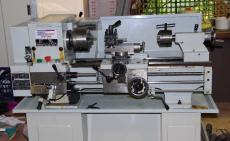Protecting tools
 If you live in an area that has a hot, wet summer, you’ll be all too familiar with the nightmare of tools rusting.
If you live in an area that has a hot, wet summer, you’ll be all too familiar with the nightmare of tools rusting.
That’s especially the case if you have machine tools that have unprotected ground surfaces – like the bed of a lathe or a milling table. But even low-priced tools like drill presses have unprotected columns and chucks.
Leave the tools for a few weeks in these climatic conditions and you’ll find a veneer of surface rust. Leave them for a month or two and the rust will have started to bite into the surfaces.
The problem is even greater if you’re not using the tools on a daily basis. The more often you use the tools, the more likely that there will be oil and other lubricants being applied, so protecting the surfaces from corrosion.
Over the years I have built up a workshop I am very happy with. A lathe, vertical mill, grinder, belt sander, bandsaw, hydraulic press and many power and hand tools make up the main elements. In the past I have liberally applied spray lubricants like WD40 (and equivalents) to prevent rusting. However, yesterday, when I (finally!) finished giving the workshop a big clean, I took another approach.
Using a ‘Chux’ style washing-up cloth, I applied normal (clean!) engine oil to the surfaces. The Chux cloth holds the oil very well in its pores, allowing a thin and consistent layer of oil to be applied, while the heavier oil better adheres to vertical and upside-down surfaces. Compared with using an aerosol spray, you also inhale vastly less poisonous mist of airborne oil particles. And of course, it’s a very cheap process – a litre of oil goes a very long way.
In fact, for hand tools, the cloth needs to be kept only moistened with the oil. Hammers, tyre levers, older (un-chromed) pliers and similar tools all got a wipe-over.
On the drill press the chuck, column and exposed nuts and bolts were oiled. On the mill, the complete T-slot table and the ways; on the lathe, the ground beds and the unpainted surfaces of the carriage. And so on…
Of course, you might say – who wants to then have to use oily and slippery tools? But if that’s a problem, you simply use a clean cloth to wipe the parts you’re handling, then oil them again afterwards.
If you live in a very dry climate, or have a workshop where the temperature and humidity are tightly controlled, none of this will be relevant. But for many, I think good old engine oil and a washing-up style cloth will give tool protection for more enduring than spray penetrating oils. And the approach is cheaper and safer too.

 Julian Edgar, 50, has been writing about car modification and automotive technology for nearly 25 years. He has owned cars with two, three, four, five, six and eight cylinders; single turbo, twin turbo, supercharged, diesel and hybrid electric drivelines. He lists his transport interests as turbocharging, aerodynamics, suspension design and human-powered vehicles.
Julian Edgar, 50, has been writing about car modification and automotive technology for nearly 25 years. He has owned cars with two, three, four, five, six and eight cylinders; single turbo, twin turbo, supercharged, diesel and hybrid electric drivelines. He lists his transport interests as turbocharging, aerodynamics, suspension design and human-powered vehicles.

on February 12th, 2008 at 7:01 am
There’s another product you can use, it’s called dewatering fluid. The drum I purchased through Repco years ago was produced by Castrol but I’m sure other oil companies produce similar.
Dewatering fluid is slightly more viscous than penetrating oil (WD-40)etc. And when the solvents dry out of it it leaves a waxy film on the metal that stops rust.
Catrol produced 2 versions of this product at the time – DWF & DWF Marine. The Marine version was for harsher (salt water environments).
I’ve an unfinished project car living in a similar environment to your workshop that is taking some time to complete and I give the bare metal a wipe with a rag with some DWF and no rust for a considerable amount of time. Obviously if the metal was outside the DWF would need more regular application.
The beauty of DWF is that it doesn’t hold grit & dirt as readily as oil because it dries out.
To remove it just wipe it off with a rag & some petrol, or kero, or even wax & grease remover.
on February 12th, 2008 at 9:23 am
Aaaaaaah the subtropical tool rot!
I have used oil but the dust then sticks to the oil and my machinery gets gritty.
My favourite is Lanoguard. No affils, just satisfied. Contains lanolin, from wool. (ever seen a rusty sheep?) Penetrates, protects, lubricates and almost dries so no dust, midges, gecko poo etc sticks to the tools.
Also fantastic for bicycles as a lube/protectant and it smells like a shearing shed with no sheep nuggets involved!
The oil is as old as tools themselves but we have moved on.